- Home
- J. P. Donleavy
The Destinies of Darcy Dancer, Gentleman
The Destinies of Darcy Dancer, Gentleman Read online
THE
DESTINIES
OF
DARCY DANCER,
GENTLEMAN
THE DESTINIES OF DARCY DANCER, GENTLEMAN
J. P. DONLEAVY
Copyright © 1977 by J. P. Donleavy
All rights reserved. No part of this book may be reproduced in any form or by any electronic or mechanical means including information storage and retrieval systems without permission in writing from the publisher, except by a reviewer, who may quote brief passages in a review.
First published in the United States of America in 1977
First Atlantic Monthly Press edition, February 1990
Published simultaneously in Canada
Printed in the United States of America
Library of Congress Cataloging-in-Publication Data
Donleavy, J. P. (James Patrick), 1926–
The destinies of Darcy Dancer, gentleman / J. P. Donleavy.—1st
Atlantic Monthly Press ed.
Sequel: Leila.
ISBN 0-87113-289-3
I. Title.
PS3507.O686D4 1990 823’.914—dc20 89-28306
The Atlantic Monthly Press
841 Broadway
New York, NY 10003
1
Blue strips of sky between bleak clouds this chill day before Christmas as winter entrenched across the remote midlands of Ireland. With darkness descending at tea time in the north east bedroom of a grey cut stone manor, an ample horsey woman who had the day before been riding to the hounds, groaned giving birth. The news was whispered from servant to servant down through the house and more loudly into the kitchens and louder still out across the lantern lit stable yards.
The husband of this woman, a man as well known for his gambling as he was for his generosity among cronies, had married for money and was, as he was mostly, away in England for the racing. And upon that birth day he had waged one hundred pounds on a rank outsider at one hundred to one, which had come waltzing in by eight lengths, a winner. And upon hearing the news of a boy sent a cable
NAME HIM DANCER
And with this among other names a child was christened in the small chapel at the top of the stairs. Reginald Darcy Thormond Dancer Kildare.
Reached by a mile long winding drive through vast entanglements of ancient rhododendrons, Andromeda Park stood a weather worn cold edifice three storeys tall over a basement on a hill surveying lonely standing oak, beech and chestnut trees in a forty Irish acre field inclining down to a small river. Here three children, two sisters and their baby brother played along the grassy banks of these trout waters and ran as cowboys and Indians up into the higher hills of forest hiding other distant fields and meadows. And when recaptured for meals by nurses and nannies, were led, sometimes by the ears, up wide granite steps through an oak bulletproof door fitted with a small iron barred grill out which the cross eyed butler Crooks asked visitors their business so it could be discerned as to whether they were friend or foe. The latter always being those with a bill who wanted to be paid.
His nurse called this alabaster skinned, blue eyed and black haired boy Darcy Dancer and swaddled, dressed, fed and minded him in his nursery till he was six years old when a groom taught him to ride. And sometimes at the open stained glass chapel casement, with his older sisters each holding a hand, he watched the cattle stampeding as the hunt assembled on their front lawn. Later as darkness fell he saw them through a blue tinted pane of a north east parlour window come straggling back, scarlet coats, black coats and breeches, mud spattered, horses steaming, a few lamed some maimed and all, as Uncle Willie said, relieved to be alive.
He counted from the shortest winter’s day right into early spring the lengthening minutes of light. Till on midsummer nights a cold glow lurked in the northern sky way past bedtime when in the illumined sunset darkness he listened to the donkeys braying. To be always finally lulled to sleep by the chiming bells of the clock tower from which his mother’s father had removed the hands when too many of the locals trespassed to a neighbouring hill to be told the time of day by a man who owned a spy glass. And just beyond this hill he often dreamt there were green and white bearded little fairies with angels’ wings who lived and played joyously there in the lonely grassy beyonds and would one day come and bring him into their hidden warm wonderful kingdom where nice little boys could sit with them mending shoes.
His games were to ride the hay top of ricks as they were drawn to the barns at harvest time. And his chores were picking summer berries for winter jam in the hedgerows. He grew taller amid the smells of drying saddles and the whinny of horses and the pounding of their hooves in springtimes out across the surrounding pastures. All moments of this tiny world golden within petals of a buttercup. Till one early morning dawn, falling out of bed, breaking a collarbone and rolling in agony where a rocking chair rocked, I was carried sobbing and trembling in my nannie’s arms to her bedroom further down the hall to mend and convalesce. And learn to know that just as poison lurked in the beauteous soft tissue of yellow meadow flowers, so too did pain and sorrow lie before all one’s footsteps.
And only
Some knowing
Loving hand
Could
Guide you
By
2
His sisters gone away to school in Dublin, Darcy Dancer was taught reading writing and arithmetic by Mr Arland, a tall, thin, grey suited gentleman who often said between his deep sniffs of snuff, that that was what he was, a gentleman. Who although disowned by his aristocratic father as a child borne by a serving girl, was educated at proper schools in England and later at Trinity College Dublin where he was a sizar and scholar. And often on his lips were his favourite words he used to a disputatious Darcy Dancer.
‘Please do not Kildare, be miserably negatory.’
Mr Arland came fetched each day and they sat at ten o’clock for three hours in the tiny schoolroom tucked in under the servants’ staircase. And always Mr Arland as he took his cane from the front hall and shoved it up under his arm also took his last pinch of snuff which he sucked from the tip of the back of his hand up each nostril as he stood on the front steps waiting to be ferried by pony and trap back to the village where he stayed in a grim damp room over the pub.
Following lessons, and free to run, explore and hide, Darcy Dancer often climbed up upon the massive bough of a tree where he lay stretched out holding his head in his fists, elbows on the rough bark listening to the creaking cartwheels and trudging horses heading for the underground tunnel which led from the stable yards behind and under the back of the house and way out to the light of day again in the fields. And his horse trading visiting Uncle Willie when shouting to find him there would always smilingly say.
‘Ah child, it will soon be for the likes of yourself that you’ll be inside looking out over your madeira upon the vistas that do be displaying from this house, and that the beauty and peace of your daydreaming can not be disturbed by the rough movements and noises of carts and men.’
And it was one year later on the third day of spring in the late sunny afternoon, his mother, carried in strange foot shuffling silence by the linked arms of farm hands, was lifted up the steps and through the front door. Her long dark brown riding habit bloodied and tresses of her hair hanging while she was laid upon the horsehair chaise longue, her one green and one blue eye staring at the ceiling of the north east parlour, dead. The smell of baking scones for tea in the air and on the floor of the whim room next to the chapel I had been playing with my trains, lifting the locomotive with a derrick back on the track. I heard a loud scream and choking sobs and went to the balustrade and saw down into the front hall the men standing
hunched and silent, caps in their hands, the mud broken away in lumps from their boots and scattered on the black and white tiles. They held me away till I ran in between and around them into the room. And when I looked and looked at her. Her slender ankles and white satins closed by a gold pin around her throat. The blue veins at her temples and the way she always swept through the house, casting friendly orders to the adoring servants over her shoulder, her voice so clear so certain and kind, a pleased smile always ready on her lips. And all had said that although before her marriage she was plump and plain, that following the birth of her last child, she became slender rarefied and beautiful.
The coffin made by the village butcher arrived by the farm road and was brought in through the ivy shrouded basement entrance. And a day later his father had come on the train from Dublin where during the yearling sales he’d been staying at his club. A large gloomy establishment through which once after seeing my first rugby match, I was led. Thawing my chill in front of an orange glowing turf fire and watching members like my father, stand at the great polished gleaming drawing room windows safely surveying over cigars and port the flat green velvet playing fields of Trinity College many of them had attended across the street. And I slept there in an attic room hearing the trams screeching and roaring along the road and in the morning could see the moist glossy rhododendrons and evergreen leaves that grew up from the college grounds the other side of the spear topped iron fence. And midday sat in a smoky carriage pulled by a throbbing puffing steam engine which sputtered and wheezed across a Liffey bridge and gathered speed by the blackened slate roof tops and tiny back gardens. Till out between the furze and heather covered bog lands it raced, whistle wailing along by the banks of the Canal to finally, after two hours chug into the little familiar grey and black painted station with its carefully tended always blossoming flower beds.
And all those other days I knew my father was home, when he could be heard shouting for Crooks that his boiled egg was too soft or hard or the fire to be mended and kept blazing or his newspaper found or that he would not speak to some caller who demanded to see him. And once, his monocle flashing at the bottom of the stairs, he said to me as he saw me at one of my daydreaming spots at the great window on the large landing watching out to the grove of beeches where each evening, black hundreds of wing flapping barking rooks gathered.
‘There you are, you bastard.’
Now to see on the thin narrow reddened face his lips drawn tightly as he took his long leather motoring coat from his shoulders, nodded at the members of the household who lurked genuflecting and then blessing themselves as their master entered his study. A whole day passed with his door closed on this shuttered panelled room where he sat in front of the fire drinking whiskey and listening to solemn symphonies on the gramophone. Crooks stationing a stable boy inside the door of the salon across the hall to steal forward as the music began to fade and to wind up the gramophone again and again. And the visitors in the faded blue walled parlour looking down and paying their last respects to the alabaster face cushioned by the soft black waves of hair and those vanished strange gems, the gently closed eyes of my mother.
That fifth day of spring like the first day after the end of the world had come. A storm the night before sending slates flying off the roofs and they lay scattered and broken around the house, some stuck like arrows deep in the front lawn where ancient oaks were blown over, their roots sticking up and their boughs breaking the fence. I came awake as the shutters and window frames shook and a giant stone falling from a chimney sent a great bang trembling throughout the house. The pounding gusts of the gale poured billows of turf smoke into rooms and out into the halls where it gathered high up beneath the skylights. And now heavy rain swept in wave after wave out of racing dark clouds from the west. Crooks bracing with his shoulder and needing help to slam closed the front door. The entrance hall covered in puddles from the dripping coats and umbrellas. With mourners standing backsides to the roaring fire with their dark clothing steaming and some of their chilled blue hands holding brimming glasses of brandy.
Outside lost birds knocked backwards in the sky. Floods of water shining silver below in the fresh green field where the banks of the river overflowed. Motor cars had blocked the entrance drive and wheels were churning and skidding deep into the lawn. His mother’s coffin taken from the darkly furnished north east front parlour where the smooth gleaming elm box had reposed two days on an oak wake table under the hunting portraits of my mother’s pink coated father and black habited mother. And now borne down the front steps by grooms through a way made between the vehicles and placed upon a black velvet covered cart. The voice of the head groom repeating over and over again.
‘Gently lads gently.’
All walked and the dark line of people strung out from the apron of stones fronting the house. To follow the horse drawn coffin a short way down the drive and left on to a farm road which entered the park and wound under a giant oak and down a steep hill to the dell surrounded by a grove of walnut trees. In the small walled cemetery where were buried her mother and father and two of her brothers, the musty mausoleum held coffins of Darcys and Thormonds back through generations and my sister Sybilla. The men had dug my mother’s grave by the ruins of the ancient chapel whose thousand year old arched entrance and stone foundations still stood heaped up and roofed over by ivy vines. A place where I had so many times come in summers to sit cooled and shaded by the great yew tree to watch the wasps go and come from their hole in the ground.
Shielding the pages of their bibles from the rain, a priest and a parson in attendance. The first a strange friend of my mother’s, whose elegant clerical garments were tailored in Paris, and the latter an even stranger friend, an amateur astronomer and botanist who spoke with the high pitched voice of a woman and who with his long blond curling hair was rumoured to be living in his parsonage with a man. Both usually called for tea and always brought presents, mother of pearl shells, copper boxes, and sometimes statuettes of Wedgwood and Meissen. All placed on tables and admired as the butters melted between the halved scones, and voices ranged upon vases, paintings and opera. My mother as she held the silver pot to pour, reeling off dates manners schools and motifs. And hear the refrain from her gently chewing ecclesiastic friends.
‘Yes yes superb I do most certainly agree exactly.’
Standing around the mound of mud and sods were the Master of Foxhounds, twenty three members of the hunt and four neighbouring farmers and their wives. The gombeen man of the village, whose bald black browed wife wore a blonde wig, was sheepishly rubbing his hands. And from the town, six Irish miles away, came six of the biggest shopkeepers. One near by Earl and two Barons stood under their black umbrellas with their black bowler hats in hand. A Marquis, a widowed Countess, one well known bookie and further, their backs against the cemetery wall, nine members of the household, my two red eyed sisters and twenty working men with their big fingers grasping their caps, as all these heads dripped with rain.
And my blue eyed Uncle Willie, his broad shoulders folded forward, standing next to me behind my father, was sobbing like a child. His big hand reaching up again and again to brush at the tears and rain rolling down his cheeks. And I could hear him say. As the same words were choking up against my silent lips.
I love you
Nettie
I loved you
3
Two days following the funeral Darcy Dancer’s father sold ten big bullocks at the street market in the village and without an ounce of petrol for the motor cars he left again by horse and trap-clip clopping three miles on the hilly winding road to the station. His two big thick heavy leather cases waiting that morning in the hall and I traced on the tooled large black initials of R.C.S.K. While Ruby my nurse, who had moved in semi retirement to the top floor, was packed and weeping clutching me, was gone with my sisters minutes later.
The next day a cable came from Dublin. The pale green envelope emblazoned with a black harp. Crooks s
olemnly brought it on a tray. Standing above me in the whim room intoning.
EN ROUTE VIA LIVERPOOL STOP IN EMERGENCY ONLY CONTACT RITZ LONDON
And Crooks retreating with his crossed eyes and now just one of his front upper teeth left to hardly brighten his rare smiles. As he daily, along with six other pairs of hands, continued to run the slowly collapsing household.
And still with each week day at his appointed hour Mr Arland stepped from the trap, lifted his chin and always turned to look down the sloping parkland to the river and then reach into his pocket, take out his big gold watch and regard the time. The stitching threads hanging loose from his little battered briefcase across the top of which he held his cane. His nervous sometimes twisting mouth which always seemed to draw a deep breath before he climbed the steps. Just as I would then speed from the whim room and along the stone paved corridor and down the servants’ staircase at the end. To await Mr Arland’s arrival as I sat steeped in laborious study. When came his tapping of the blackboard pointer and I would then sit book open over the grim wastelands of Latin as his kindly reasonable voice spoke from his thin white face.
‘Kildare, you are being automatically stupid.’
And then as we embarked upon English grammar and punctuation, Mr Arland kept by his left hand a volume of poetry into which he would refer his eyes, patiently waiting for me not to be automatically stupid.
‘Kildare, when do we use a period.

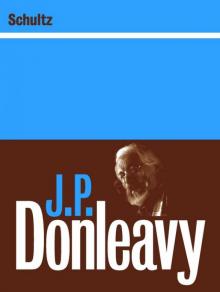 Schultz
Schultz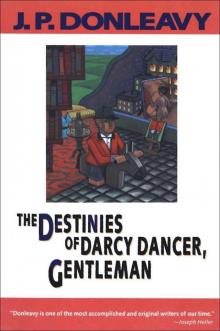 The Destinies of Darcy Dancer, Gentleman
The Destinies of Darcy Dancer, Gentleman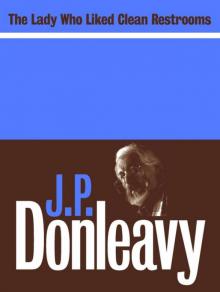 The Lady Who Liked Clean Restrooms
The Lady Who Liked Clean Restrooms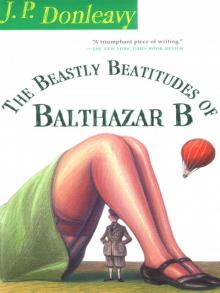 The Beastly Beatitudes of Balthazar B
The Beastly Beatitudes of Balthazar B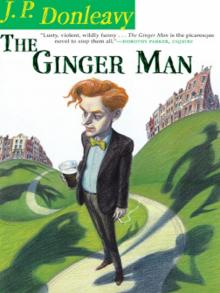 The Ginger Man
The Ginger Man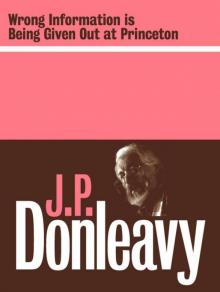 Wrong Information Is Being Given Out at Princeton
Wrong Information Is Being Given Out at Princeton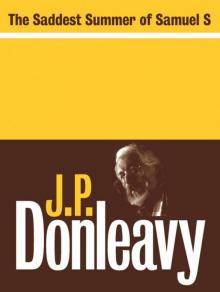 The Saddest Summer of Samuel S
The Saddest Summer of Samuel S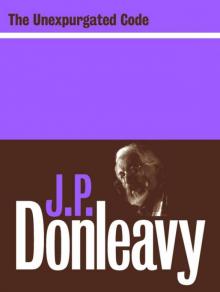 The Unexpurgated Code
The Unexpurgated Code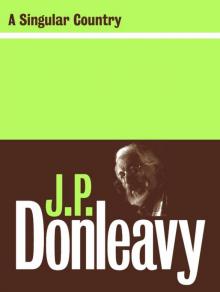 A Singular Country
A Singular Country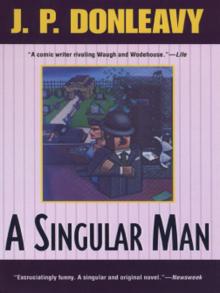 A Singular Man
A Singular Man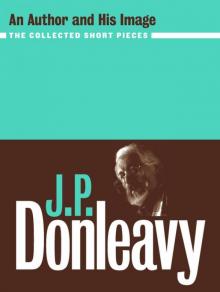 J.P. Donleavy: An Author and His Image
J.P. Donleavy: An Author and His Image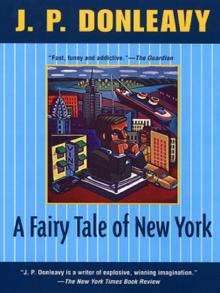 A Fairy Tale of New York
A Fairy Tale of New York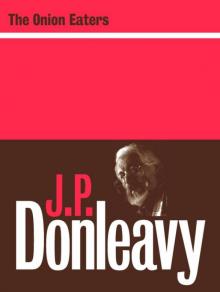 The Onion Eaters
The Onion Eaters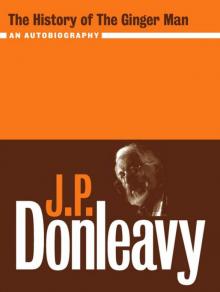 The History of the Ginger Man: An Autobiography
The History of the Ginger Man: An Autobiography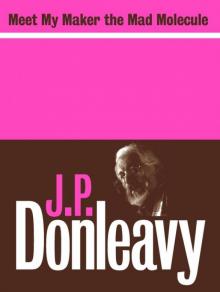 Meet My Maker the Mad Molecule
Meet My Maker the Mad Molecule Leila
Leila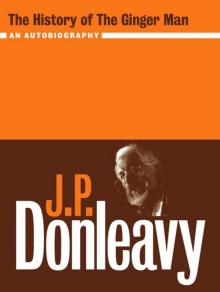 The History of the Ginger Man
The History of the Ginger Man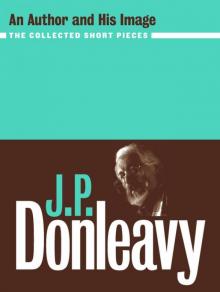 J.P. Donleavy
J.P. Donleavy